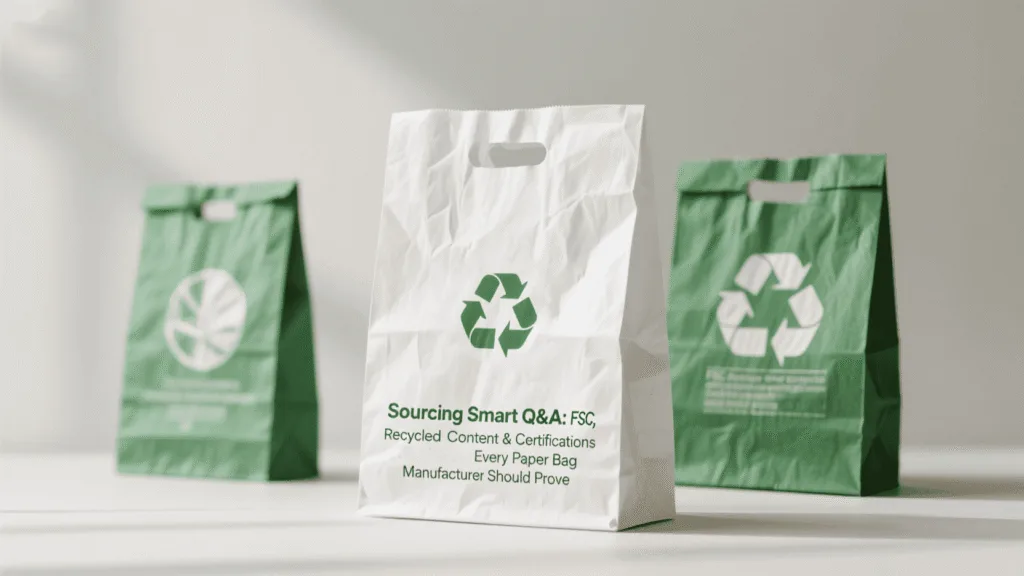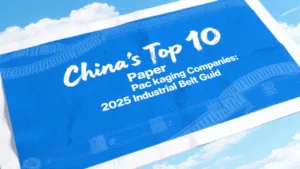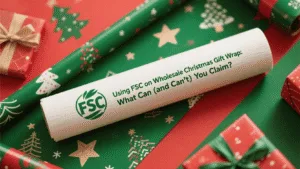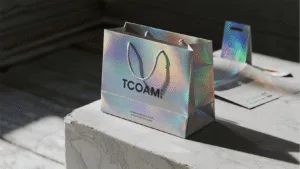You’re trying to source sustainable packaging, but every supplier website is filled with vague claims like "eco-friendly" and "green." You’re worried about greenwashing and the risk of partnering with a manufacturer who can’t back up their promises with real proof.
To source smart, you must ask for proof. The most important certifications a paper bag manufacturer should provide are FSC® (Forest Stewardship Council®) for responsible forestry, verifiable documentation for recycled content (especially PCW), and social compliance audits like BSCI.
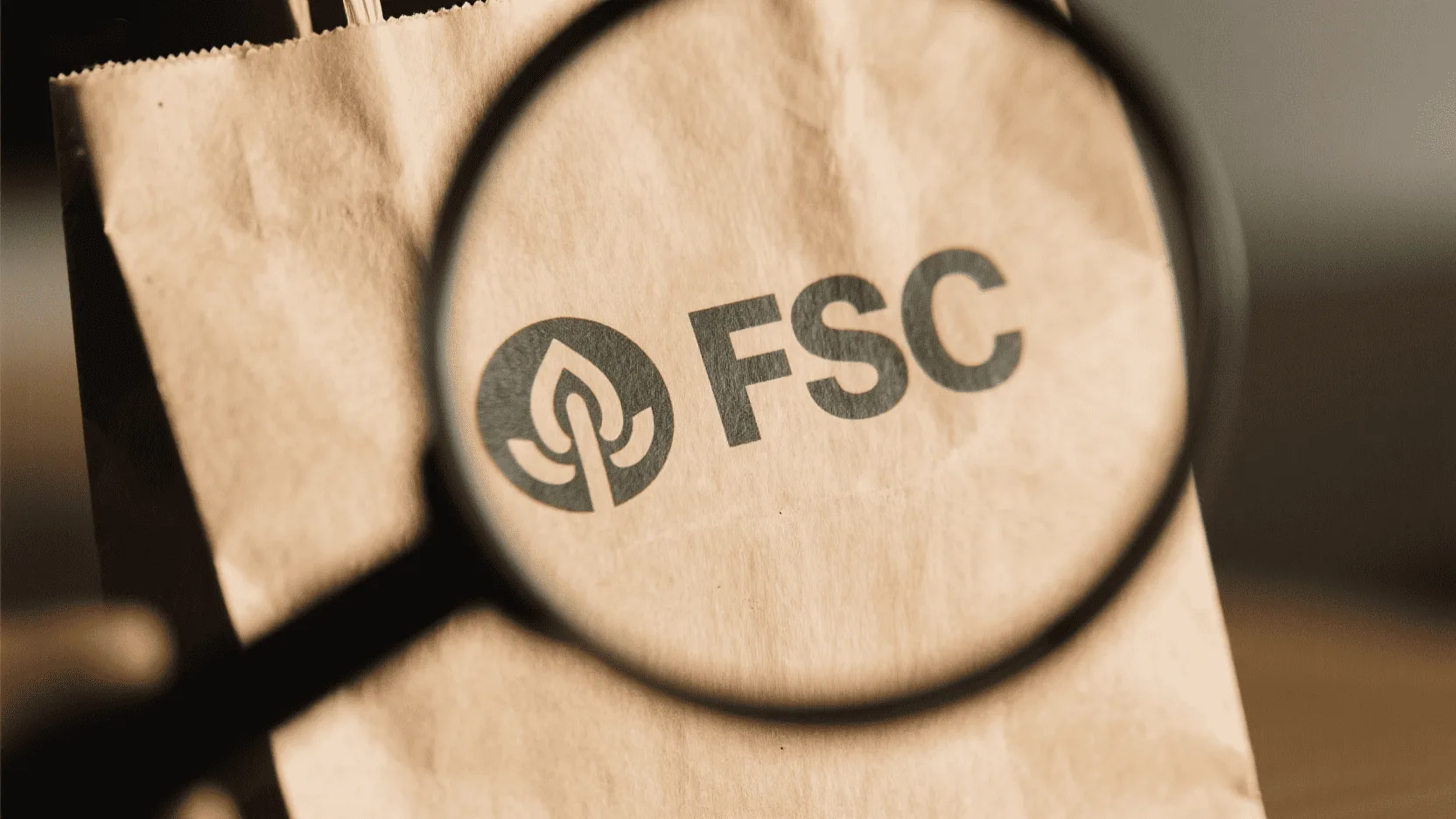
Over my years in this industry, I’ve seen the term "sustainable" go from a niche request to a core requirement for brands. I remember in the early days, many factories would just say "yes, our paper is eco-friendly" without any substance behind it. It forced me to learn what to ask and what proof to demand. Sourcing responsibly isn’t just about feeling good; it’s about protecting your brand’s reputation and ensuring you’re truly making a positive impact. So, how do you cut through the noise and find a partner you can trust? Let’s break down the essential proofs you should be asking for.
What Exactly is FSC Certification and Why Should You Demand It?
You see the FSC logo on products, but you aren’t completely sure what it guarantees. You wonder if it’s just another marketing label or if it holds real weight in ensuring your paper bags are sourced responsibly.
FSC (Forest Stewardship Council) is a globally recognized certification ensuring that the paper used in your bags comes from forests managed to protect biodiversity, respect the rights of Indigenous peoples, and maintain ecological integrity. It is the gold standard for ethical wood sourcing.

Demanding FSC certification is the most direct way to ensure your packaging doesn’t contribute to deforestation. The system is built on a "Chain of Custody" (CoC) model. This means that every single company in the supply chain—from the forest itself to the paper mill, the distributor, and finally our manufacturing facility at Omet Packaging—must be independently audited and certified. If even one link in that chain is broken, the final product cannot legally carry the FSC label. I once had a potential client who was comparing our quote with a cheaper one. The other supplier claimed they used FSC paper, but when the client asked for their CoC certification number, they couldn’t provide it. They were buying certified paper but weren’t certified themselves, breaking the chain. This small detail saved my client from making a false claim to their own customers. Always ask for the supplier’s FSC CoC number, which you can verify on the FSC Public Search database.
There are three main FSC labels you will see on products:
| FSC Label Type | Meaning | Best For |
|---|---|---|
| FSC 100% | All materials used are from FSC-certified forests. | Brands wanting the highest level of assurance. |
| FSC Mix | A mixture of material from FSC-certified forests, recycled material, and/or FSC controlled wood. | A balance of sustainability and availability, the most common label for packaging. |
| FSC Recycled | All materials are from 100% recycled content (pre- or post-consumer). | Brands prioritizing a circular economy and reducing virgin material use. |
How Can You Verify a Manufacturer’s Claims About Recycled Content?
A supplier tells you their paper bags are "made with recycled content," but that could mean anything from 1% to 100%. You need to know the real numbers to make an informed decision and avoid paying a premium for a misleading claim.
You can verify recycled content by requesting official documentation from the paper mill that specifies the percentage of Post-Consumer Waste (PCW). Vague claims are a red flag; a transparent manufacturer will eagerly provide these material specification sheets.
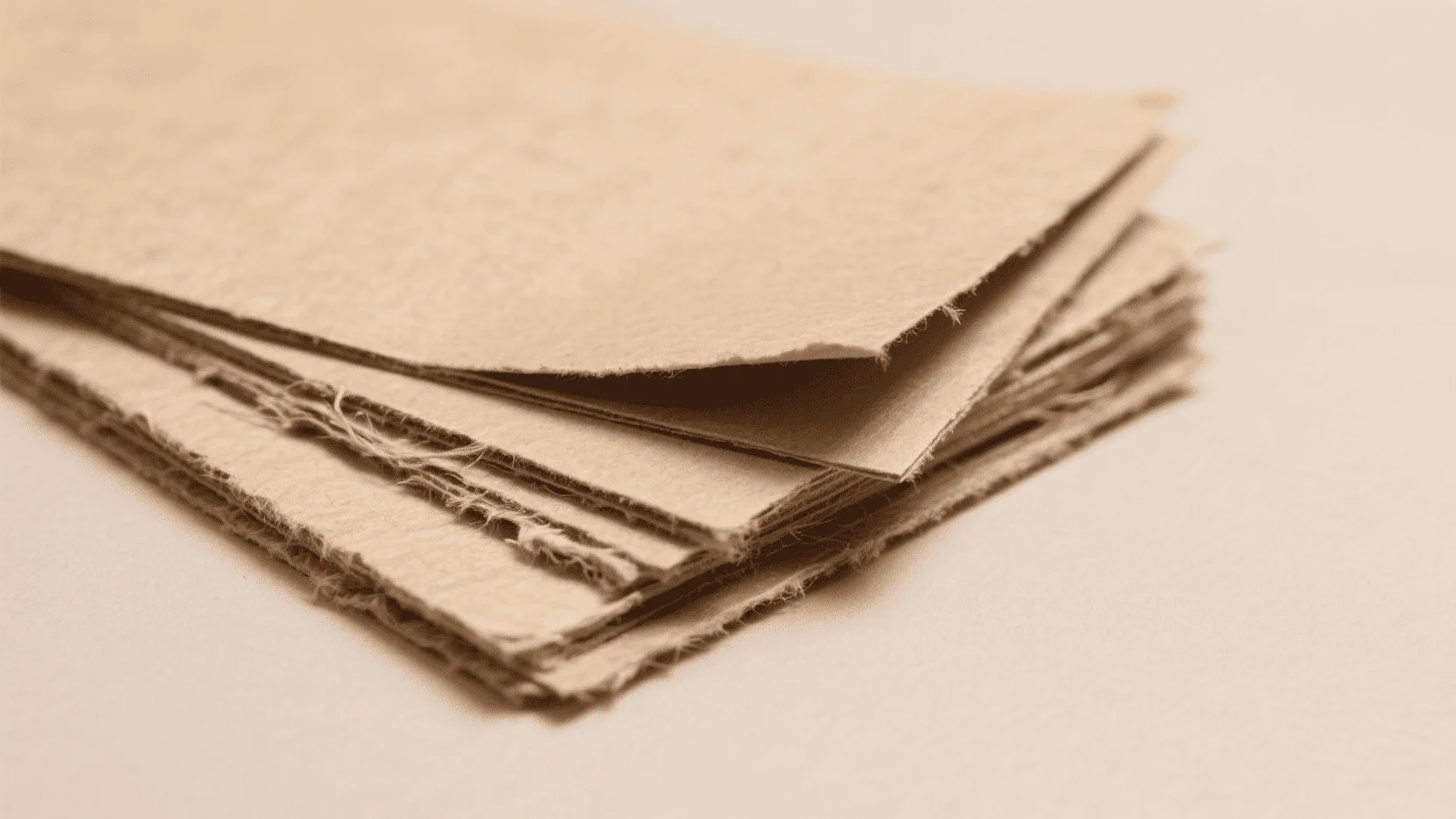
The term "recycled" can be tricky because it includes two different types of material. The first is "pre-consumer" waste, which is scrap material from the manufacturing process itself (like paper trimmings). While it’s good this is reused, it never actually reached a consumer. The second, and more impactful type, is "post-consumer waste" (PCW). This is paper that has been used by a consumer, collected through a recycling program, and re-pulped to make new paper. This is what truly closes the loop in a circular economy. When you source recycled bags, always ask for the PCW percentage. A supplier who can’t or won’t provide this might be using a very low percentage or only pre-consumer waste. We once worked with a client on a food packaging project who was committed to using at least 40% PCW. We had to source from a specific mill and provide the client with the mill’s official certificate to prove the content. It’s also important to understand the trade-offs. Higher PCW content can sometimes affect the paper’s brightness, smoothness, and tensile strength. For a luxury cosmetic box, we might recommend a lower PCW content to maintain a premium feel, while for a simple grocery bag, a higher PCW content is perfect. A good partner will help you find the right balance for your specific needs.
Beyond Environmental Proof, What Other Certifications Ensure a Reliable Supplier?
An eco-friendly bag is worthless if it’s made in a factory with poor labor conditions or inconsistent quality control. You know that a partnership with an unethical or unreliable supplier could seriously damage your brand’s reputation and lead to costly product issues.
Beyond green credentials, look for social compliance and quality management certifications. BSCI (Business Social Compliance Initiative) proves ethical labor practices, while ISO 9001 ensures a robust quality management system is in place for consistent production.
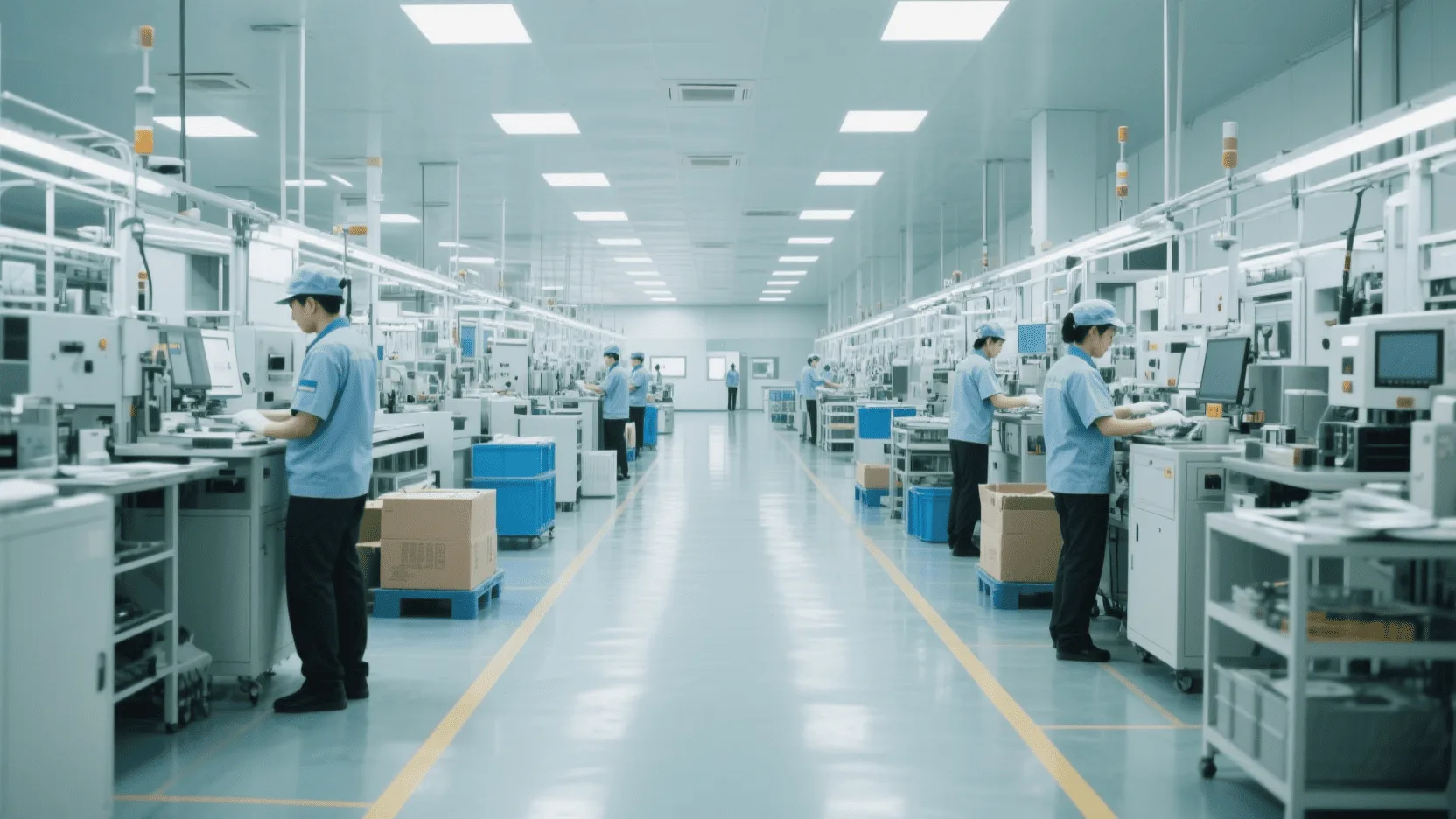
These certifications show that a manufacturer is committed to being a responsible business partner in every way. Going through these audits is a long and expensive process, so a factory that invests in them is serious about long-term quality and ethical conduct. When my company, Yiwu Omet Packaging, first went through the BSCI audit, it was a huge undertaking. It required us to open up every part of our operation for inspection, from employment contracts and working hours to health and safety protocols. But it was completely worth it. It gives our clients—many of them major global brands—the peace of mind that their products are being made in a safe and fair environment. It’s not just about compliance; it’s about transparency and trust. When you’re vetting a new supplier, don’t just ask if they are certified; ask to see their latest audit report. A reliable partner will have nothing to hide.
Here are the key non-environmental certifications to look for:
| Certification | What It Proves | Why It Matters to You |
|---|---|---|
| BSCI | Adherence to fair labor practices, including no child labor, fair wages, and safe working conditions. | Protects your brand from being associated with unethical labor and ensures supply chain stability. |
| ISO 9001 | A formal quality management system is in place to ensure consistent product quality and customer satisfaction. | Reduces the risk of defects, delays, and costly errors, ensuring your packaging meets your standards every time. |
| Sedex/SMETA | A widely used social audit that assesses labor standards, health & safety, environment, and business ethics. | Provides a detailed and transparent report on a supplier’s ethical performance. |
Conclusion
Sourcing truly sustainable packaging requires moving beyond surface-level claims. By asking for specific, verifiable proof like FSC certification numbers, PCW content documents, and BSCI/ISO audit reports, you can build a transparent and reliable supply chain that reflects your brand’s values.
Ready to partner with a manufacturer who can prove their commitment to quality and sustainability? Contact us at Omet Packaging to discuss your project.
Explore more insights on packaging and sourcing on our blog.
FAQ
1. Is FSC-certified paper more expensive?
FSC-certified paper can sometimes have a small premium, often between 5-15%, depending on the paper type and market availability. However, many brands find this cost is easily justified by the added brand value, customer trust, and risk mitigation it provides.
2. Does using recycled paper affect the print quality of my bags?
Paper with a high percentage of Post-Consumer Waste (PCW) can be less bright and have more visible fibers, which can slightly alter print results. However, modern paper mills produce high-quality recycled paper suitable for most designs. For very bright, vibrant colors, a lower PCW content or a coated recycled paper might be a better choice. A good manufacturer will provide samples so you can see the result firsthand.
3. What’s the difference between FSC and other forest certifications like SFI?
FSC (Forest Stewardship Council) is the most widely recognized global certification and is generally considered the most rigorous standard by many environmental groups. SFI (Sustainable Forestry Initiative) is another standard, primarily used in North America. While both aim to promote sustainable forestry, they have different standards and governance structures. For brands selling internationally, FSC is the most recognized and accepted certification.

